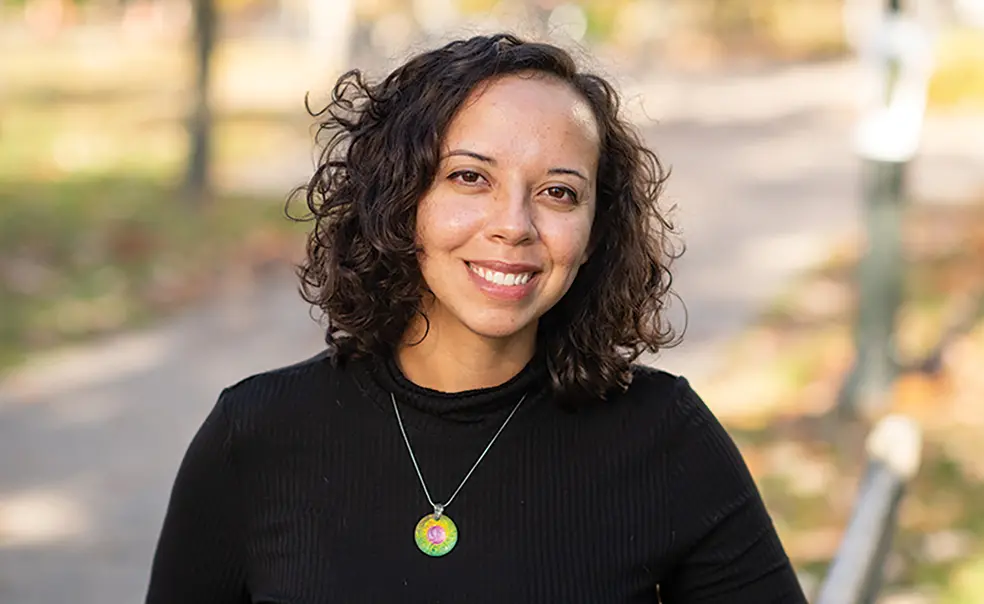Assistant Professor Rebecca Carey on the Psychology Behind Protests
In the past few months, a wave of protests in response to the Israel-Hamas war has swept across the country, particularly on college campuses. Why now? Assistant professor Rebecca Carey, who studies solidarity, identity, and why people take actions to reduce inequality, spoke with PAW about what motivates protesters and what opposing sides can do to understand each other.
Can you talk about your research and what drew you to this work?
The origins of my research stems from my interest in social class and thinking a lot about how social class impacts relationships. I’ve studied this in quite a few directions, the one most relevant relates to thinking about what motivates people to advocate for reducing economic inequality and for improving the outcomes of those with worse socioeconomic status in society. That line of research really stems from this question of what motivates and convinces people to act in favor of those who are part of lower-social-classes?
What leads people to protest?
While I don’t research this directly, the theoretical things we draw on are relevant. When it comes to collective and social identities, in the strictest terms, individuals see a group has suffered an injustice. If they are part of that group or identify with that group, they are very motivated to do something.
What motivates those who are not directly impacted?
There are all kinds of ways in which collective identity can happen, even for those who aren’t part of the group. They may have an identity that’s associated with activism or wanting to stop injustice, so they see themselves as part of a group pulled to help reduce inequality. Also, they may have a close relationship with those who are part of the impacted group, so they take on the collective identity by caring about those people. Other motivations include the broad benefit to society and normative motive, which relates to the benefits that come from the support of the people around you and the rewards that translates into. One other factor is personal motivation, which may include for example the happiness one feels of working with others to create change.
Similarly, what role does your environment play?
There’s a whole literature around resource mobilization and the idea of how important it is to have access to information and opportunities in order to support collective action. You can have all of the care, concern, and sympathy in the world, but if you’re in an environment that doesn’t provide opportunities, you’ll be unlikely to engage. That’s likely why college campuses are important sites of protests, because they lend themselves to spreading information in an organized and effective manner. Efficacy, the belief that something can be done to promote change, is another important component of collective action that is often reinforced in groups because it becomes about “us” instead of “me.” I’d add that there’s probably a lot of power in technology to help connect people and strengthen identities.
Do concepts like groupthink, where people go along with the group without forming their own opinions, play a role?
The origins of social psychology started taking off after World War II, when people were really trying to understand how seemingly good people could be convinced to do really horrible things. This all falls broadly under the umbrella of social influence which can be good and can be bad. I think this has been a part of the narrative that often undermines these efforts by painting collective action under the light of negative social influence. That's why I believe it's so important to highlight and identify the source of efficacy that drives people to create important social change and reduce injustice.
Protests often stem from disagreements. What helps foster interactions across groups?
When two sides have very negative views of each other or perceive the other is causing harm and it’s a matter of life and death, I think one of the big challenges is dehumanization and overly villainizing and representing people by negative stereotypes, rather than seeing them for humans who have worth and value. Rehumanizing folks is a really important step to lead to effective intergroup interactions. So, imagine how challenging it must be in the space of something like a protest to be able to do that. There’s so little opportunity.
Where can people begin if they want to understand the other side?
One thing is the importance of narratives. To combat negative beliefs about a group, it helps to connect with people on an individual level to hear their story. Talking with someone about their struggles, for example, can be really important to shift that narrative. While interactions are so critical, it’s kind of fraught to say that because often when it comes to groups who have conflicts, there are power inequities and that could place an unfair burden on members of the group who have less power to explain themselves. This points to the importance of having spaces where this can happen, which I think is a structural problem in society.
Interview conducted and condensed by C.S.












No responses yet